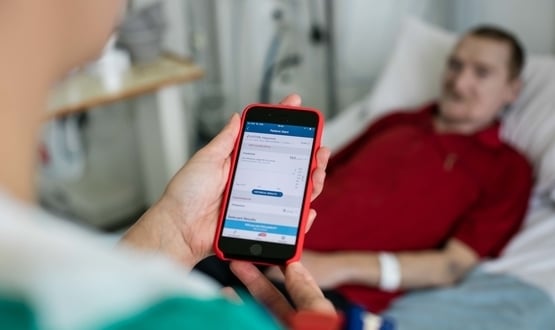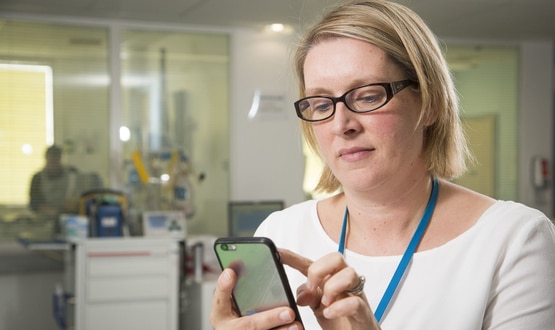Google DeepMind’s Streams technology branded ‘phenomenal’

An NHS consultant nurse who is part of a team using an app which helps to detect early signs of kidney failure has branded it ‘phenomenal’.
Sarah Stanley, who leads the patients at risk and resuscitation team at the Royal Free Hospital in north London, is one of 30 using Google DeepMind’ Health’s Stream app.
The British machine learning company’s technology sends a range of test result data straight to staff’s mobile phones and alerts them to which patients could be in danger of developing acute kidney infection (AKI).
This means doctors and nurses can respond in minutes rather than hours or days.
Stanley told Digital Health News that this saved her team a ‘huge amount of time’ and has made a ‘phenomenal’ difference to day-to-day actives.
“Prior to Streams, we did have access to all the same information but you would have to find a computer and then log onto the system to see the results,” she said.
“This would take a long time but now Streams makes everything more flexible and means alerts are sent straight to our mobile phones without the need to physically check results ourselves.
“Everything is in one place.”
Streams, which was introduced to the hospital in January, also provides staff with the ability to communicate with each other as the alerts are sent to everyone and they can all let each other know whether they have picked it up or not.
Stanley said this was an unintended benefit as it removed the need for staff to page each other and then wait to see who responds.
Another unexpected benefit Stanley said was the fact patients could be shown their results on a graph which boosts staff’s interaction with them.
“Before Streams we could still show patients their results but it would be in numerical format which might have been harder to understand,” Stanley said.
“Staff would also have to find a computer and then wheel it in to show the patients, but now we just show them on our mobile phones so it again saves time.”

The Royal Free London Hospital NHS Foundation Trust signed a five-year deal with DeepMind in November 2016 and Stanley said that the trust is hoping to roll out Streams at Barnet Hospital in mid-2018.
She also praised the usability of the app and said it took minutes for staff to learn how to use it.
Dr Dominic King, clinical lead at DeepMind Health, said the company had worked ‘closely’ with clinicians at Royal Free so it could understand how the technology could fit in their day-to-day lives.
“We wanted to understand, in as much detail as possible, what information they needed to have at their fingertips, and how we could present it so that it was most useful to them in an urgent care situation,” King said.
“The result is Streams, our secure mobile app that has been built for front-line doctors and nurses.
“It draws information from a variety of different sources and puts it into the palm of clinicians’ hands.”
King, who has previously worked as an NHS doctor, also told Digital Health News that a formal evaluation of Streams would be published next year and the early signs were ‘encouraging’.
Royal Free’s relationship with DeepMind has been controversial in the past.
The information commissioners office (ICO) ruled in July that the trust failed to comply with the Data Protection Act when it provided details on 1.6m patients to DeepMind.
The ICO investigation found several shortcomings in how the data was handled, including that patients were not adequately informed that their data would be used as part of the test.





9 Comments
It should be made clear that the DeepMind Streams product does NOT use any AI. It’s AKI alerting uses the standard NHS AKI algorithm (based on blood results + age). As they discuss here:
https://deepmind.com/blog/streams-and-ai/
Their diagram on this page suggests the Royal Free (and presumably other customers) already use the AKI algorithm anyway, and the difference Streams makes is in facilitating the notification. That’s no doubt useful, but not exactly a technological breakthrough.
One might wonder at the strategic aims of pure AI research company providing a non-AI clinical application to the NHS, effectively for free. The implication is that Streams is the first step in creating a platform to enable data collection, and subsequent alerting.
Mobile-based data capture, review and alerting is great, but worth noting that several similar platforms having been running for some time e.g.
http://vitalpac.com/
http://nervecentresoftware.com
http://www.send-system.co.uk/#
(no affiliation)
Also, while it’s not my field, but it’s unclear why Streams required 1.6M identifible patient records for ‘testing’? If they were applying the standard NHS AKI algorithm to current inpatients (some bloods + patient age), why would they need such a wide and deep amount of patient data? Perhaps Digital Health could ask about this?
This was troubling me too.
Yes, great to see technology delivering better health care for patients and efficiencies for the service.
But where is DeepMind, the AI and who is doing what with the 1.6 million records?
Most patients think we share all info anyway – they are genuinely surprised and annoyed when I tell them that not that much info is passed between primary and secondary care etc.
I think we should shift the focus to assumed consent to share unless patients specifically state otherwise and, if they do state otherwise, then they should sign a form saying they understand they are aware they are compromising the provision of their own healthcare.
Amazing progress, in spite of a cost collapsing health care system (world wide). And yet, the hysterics cry BUT MY PRIVACY.
The HCFA laws criminalize and bureaucratize health confidentiality, to make this AI solution a problem, instead of a gift.
One way through that it to gain consent to use any available information for the benefit of the person’s health. That allows you to break down the idiotic silos we create with the data, which is an integrated whole when it leaves the citizen, and arbitrarily split up by us and our organisation-centric approach.
We need to compare this experience to the analogue world. I think DeepMind got unfairly big stick because of it’s association with Google. If the analytics is used for frontline clinical care, how is it different from using other AI methods in hospital processes i.e. Voice recognition for Telephony or Digital dictation. Or how is it different from clinicians (human collective intelligence) discussing a group of patients in an MDT to learn from each others experience. I presume the answer is that all patients discussed in a cancer MDT need to be consented prior they being diagnosed with cancer?
We need to publicise the harm done by status quo of not using technology. For example, we were told we can only use NHS.net to NHS.net email for communication, so we avoid all e-mail communication, but happy to mis-direct posts by internal + royal mail + faxes. Ten years of NHS.net email and we are still stuck in the past. How many NHS letters & results are in the warehouse being investigated for ‘harm done by lost communication’?
Have we asked patients whether they would mind if their data can processed with analytics to improve their care? We can spin this story either way – Big brother is spying on you or Big data can help shorten the road to illness recovery. There is a middle-road, which is, consenting everybody, but those who are the sickest may not be able to consent i.e. the person who is brought into A&E in a coma. Are we going to avoid analysing their blood results with a specific new algorithm because they can’t consent? What if they wake up and sue the hospital for not doing our best to help them.
At the end of the day it is all a matter of trust.
We should be using stories like this to promote the use of AI and big data in order to counter the usual BMA/Daily Mail narrative, and then give patients to opportunity to opt out. I bet a large proportion don’t.
It still doesn’t mean the debate isn’t valid. Do I want DeepMind gobbling up my data, without my informed consent to this use of my data? Maybe I don’t…. I need to be given the choice.
Hence why there needs to be stories like this. So there is an actual debate and not ignorant views formed
Comments are closed.